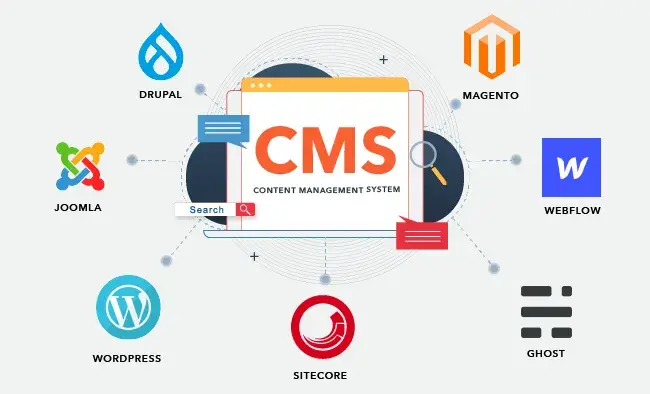I’m a new blogger who stepped into the wide world of the internet. After learning about WordPress, which is a tool for blogging that aims to make the process easy and convenient. While WordPress continues to lead the market, I’ve learned that there are other fantastic CMS platforms out there, each with its own unique functionality. At the end of this article, which is my journey through various alternatives, you might find your perfect fit.
What is WordPress?
It is an open source Content Management System (CMS) which was introduced in 2003, it allows users to develop and maintain websites without having advance technical(coding) knowledge. Because of its adaptability and ease of use, it can be used for a wide range of purpose, from simple personal blogs to complex websites like online stores and business portfolios.
One of its most significant advantage is its versatility. Users can change the style and functions of their websites using numbers of free themes and plugins available. Plugins and add features like social media integration, contact forms etc. It supports responsive design, which ensures that the website appear great on any platform. It also includes tools for media management, search engine optimization and text editing, making it an all-in-one solution for presence. As of now, it powers over 40% of all websites worldwide, making it the most popular CMS.
What is a CMS?
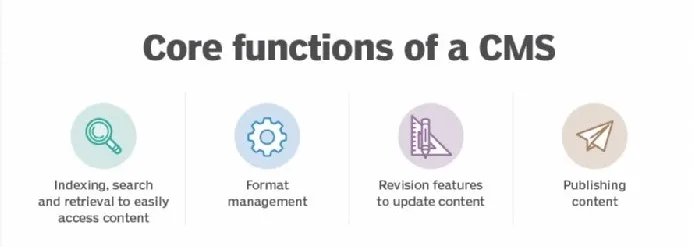
A CMS is software designed to help users create, manage and modify digital content on a website even if the user don’t have technical skills. It simplifies the process of building and maintaining websites, making it accessible for everyone, from individuals to businesses. With a CMS, users can easily manage your website’s content like text, images, videos, and documents. It saves both time and effort, allowing users to focus on creating great content and growing their website. Most CMS platforms also offer pre-designed templates and themes, so that users can give their site a professional look without any design skill. They support plugins and adds features like online shopping, SEO and analytics, it gives users so much ways to customize their site. Some of the most popular CMS are WordPress, Joomla, Wix, Squarespace and Drupal. Each one is designed to meet specific needs, so that users can choose the one that works best for the them. With CMS, managing website becomes simple and efficient, helping users keep it fresh and aligned with their goals.
Why WordPress?

WordPress is one of the most popular platforms for building websites and its powering over 40% of all sites on the internet. Here’s why it’s a top choice for many:
- Beginner-Friendly
WordPress is easy to use, even if you have no experience with coding or website design. It’s easy-to-use interface makes managing the website effortless, whether the user adding content, changing the look, or installing new features. - A Wide Variety of Themes
No matter what kind of website user want to create (a personal blog, an online store, or a corporate site) WordPress has thousands of themes, including free and premium options, user can find a design that perfectly matches their style and needs. - Endless Possibilities with Plugins
WordPress has built-in features, its real strength lies in plugins. There’s a plugin for almost anything user can think of, like adding contact forms, improving SEO, creating online stores, or even enhancing site performance. - Supportive Community and Regular Updates
WordPress has a massive global community of users and developers who are constantly improving it. This means users will benefit from regular updates, new features, and robust security enhancements. And the community is always there to help if users run into any issues.
Alternatives to WordPress
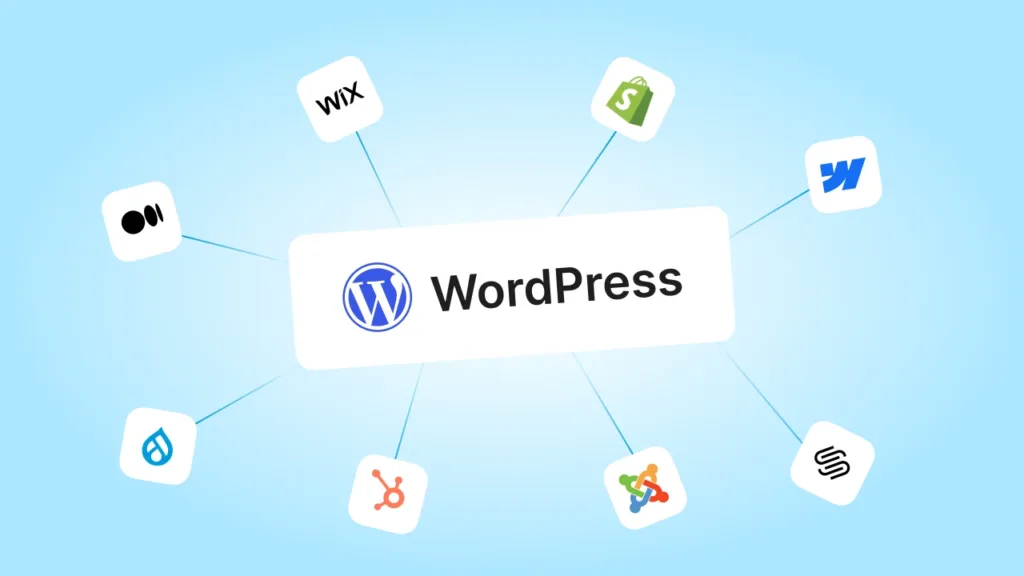
Joomla: A Powerful and Versatile CMS
Joomla is a robust CMS that strikes a balance between simplicity and advanced functionality, making it a great choice for both beginners and experienced developers. Whether you’re building a small personal site or a large-scale web application, Joomla offers the tools you need to create a functional and visually appealing website.
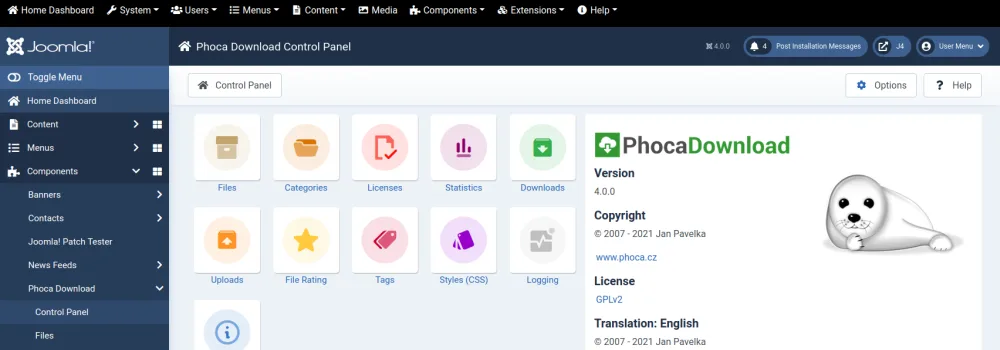
Ideal Use Cases
Joomla is especially good for:
- E-commerce Websites: Its built-in tools and extensions make managing online stores efficient and straightforward.
- Multi-language Websites: Joomla supports multiple languages out of the box, making it an excellent choice for businesses or organizations catering to global audiences.
- Community Portals and Social Networks: With features like advanced user management and customizable layouts, Joomla excels at building community-focused websites or membership platforms.
- Advanced User Management
One of Joomla’s standout features is its complex user management system. It allows you to create multiple user roles with varying levels of access and permissions, making it ideal for collaborative websites where different team members or users need specific functionalities. - Fewer Plugins, More Built-in Features
Unlike some CMS platforms, Joomla comes with a lot of advanced features built in features. This means user won’t have to rely on too many plugins to add functionality, which saves time and avoids compatibility issues. - Easy to Use and Customize
Joomla offers a flexible platform that’s easy to customize. Developers can create unique templates and add advanced features, while beginners can enjoy its user-friendly interface to build and manage their websites without much hassle. - Strong Community and Support
Joomla has a large, active community of users and developers who are constantly improving the platform. Regular updates, security enhancements, and a wealth of resources make it easy to find help and stay up-to-date.
Drupal: A Powerful CMS for Large-Scale Projects
Drupal is also a robust Content Management System (CMS) that’s widely recognized for powering some of the most complex and large-scale websites. It’s particularly popular among large organizations, government projects, and institutions due to its flexibility, scalability, and high level of customization. Drupal is the go-to platform for websites that need to handle large volumes of content, users, and data while ensuring top-notch performance and security.
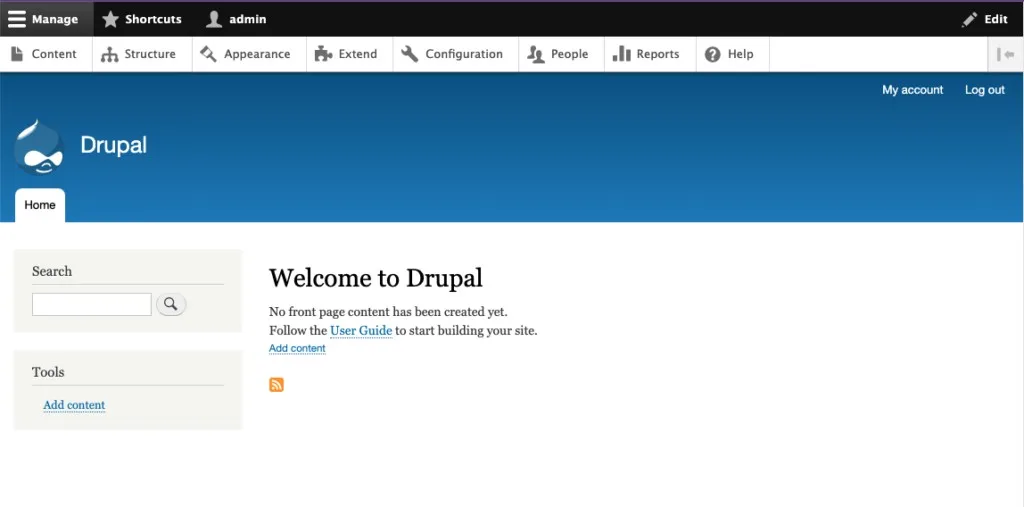
Ideal Use Cases
Drupal is particularly effective for:
- High-Traffic Websites: It’s perfect for major corporations, news outlets, and educational institutions that require reliable content management for large, high-traffic sites.
- Government and Enterprise Projects: With a focus on security, compliance, and scalability, Drupal is a trusted CMS for government portals and large organizations that need to meet strict regulations and maintain secure, stable sites.
- Custom Applications: Drupal’s flexibility supports complex applications like membership sites, multi-user collaboration platforms, and custom data management systems, making it ideal for organizations with specific needs.
- Security First
Security is one of Drupal’s key strengths. The platform is widely regarded as one of the most secure CMS options, with a dedicated security team that regularly reviews and updates security features. For sites where privacy and protection are critical like those in government, finance, or healthcare. It provides the reassurance of robust security measures. - Scalability and Performance
Drupal is built with scalability in mind, making it an excellent choice for sites that expect high traffic and substantial content. The platform’s architecture allows for seamless integration with external systems, handling large volumes of content, data, and user interactions without compromising performance. Whether you need to support more users, expand functionality, or integrate with third-party applications, It makes it possible. - Extensive Customization
Drupal offers a wealth of modules and themes, providing the flexibility to create highly customized websites. Developers can tailor the site’s functionality and appearance to meet the specific needs of an organization, ensuring a unique user experience and maximizing the platform’s capabilities. - Active Community and Continuous Updates
One of Drupal’s strengths is its strong, active community. With a vast network of developers, designers, and users, the community is constantly working to improve the platform. This means regular updates for new features, security patches, and modules, along with extensive resources like documentation and forums to help users troubleshoot and learn. - Collaboration and Multi-User Support
Drupal excels in environments where multiple users with varying roles need to collaborate. Its advanced user management system allows you to set permissions and manage workflows, ensuring that contributors have the right access to different parts of the site and can efficiently work together on content creation and site management.
Wix: The Simple Solution for Building Visual Websites
Wix is a well-known website builder that helps people without technical skills create visually beautiful websites. With its simple drag-and-drop interface, Wix makes it possible for anyone from small business owners to creatives to design and launch a fully functional website in no time, all without needing to know how to code. This ease of use has made it the go-to platform for people who want to establish an online presence quickly and effortlessly.
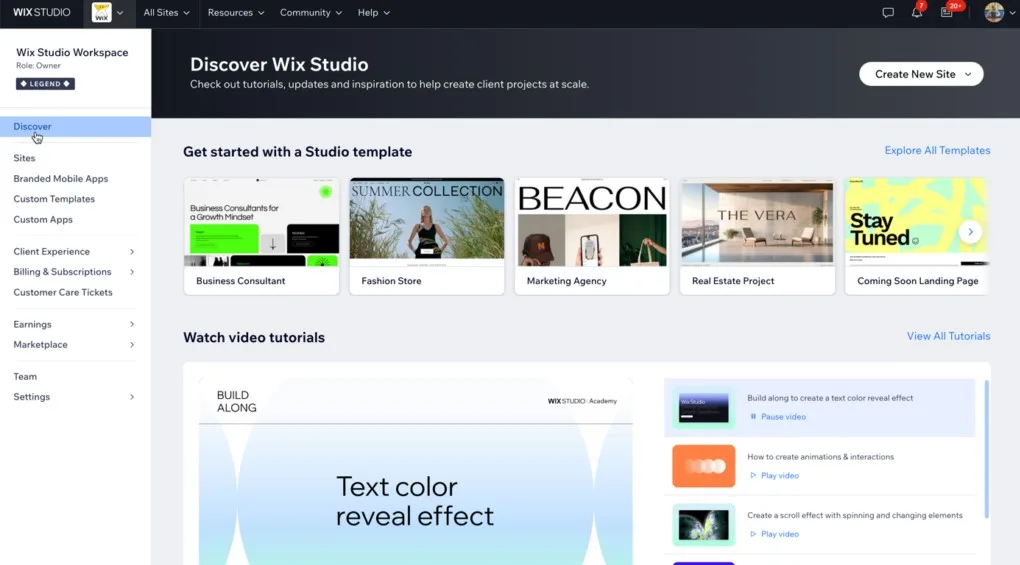
Ideal Use Cases
Wix is especially great for:
- Small Businesses: If you’re a local business or a startup, Wix allows you to build a professional online presence without breaking the bank. It offers tons of customizable templates tailored to different industries, so you can easily create a site that fits your brand’s identity.
- Personal Portfolios: For photographers, artists, designers, and other creatives, Wix makes it easy to display your work through customizable portfolios. Whether you’re showcasing your photography or sharing your design projects, Wix gives you the tools to create a polished, professional-looking portfolio.
- Simple Websites: Wix is also ideal for building single-page websites or landing pages. Whether you’re promoting a personal project, an event, or running a marketing campaign, Wix lets you get online quickly with just a few clicks.
- Easy to Use
One of the standout features of Wix is how easy it is to use. Its drag-and-drop editor means you don’t have to worry about coding or complicated technical details. Just choose a template, add your content—whether it’s text, images, or videos—and watch as your site takes shape effortlessly. You can have a stunning website ready in no time. - Design Flexibility
Wix offers a wide variety of templates to suit every style, whether you’re looking for something sleek and modern or more traditional. The best part? You can easily tweak colors, fonts, and layouts to perfectly match your brand or personal aesthetic. - Built-In Features
Wix comes packed with features that make building your site even easier. Need to open an online store? Wix has built-in e-commerce tools for setting up product pages, shopping carts, and payment options. You can also add blogs, integrate SEO tools, and even check analytics—all within the platform. - Affordable Pricing Plans
Wix offers flexible pricing options, with free plans for personal projects or experimentation and premium plans for businesses or individuals looking for more features. Premium plans include extras like a custom domain, increased storage, and enhanced design options, giving you everything you need to grow your website.
Squarespace: The Elegant Solution for Beautiful Websites
Squarespace is a website builder that stands out for its stunning, professional designs, making it a go-to option for photographers, artists, small businesses, and anyone who values aesthetics. With an intuitive platform, Squarespace allows users to create visually captivating websites quickly, without needing extensive technical skills. It also provides a comprehensive suite of tools to help you build, market, and manage your online presence seamlessly.
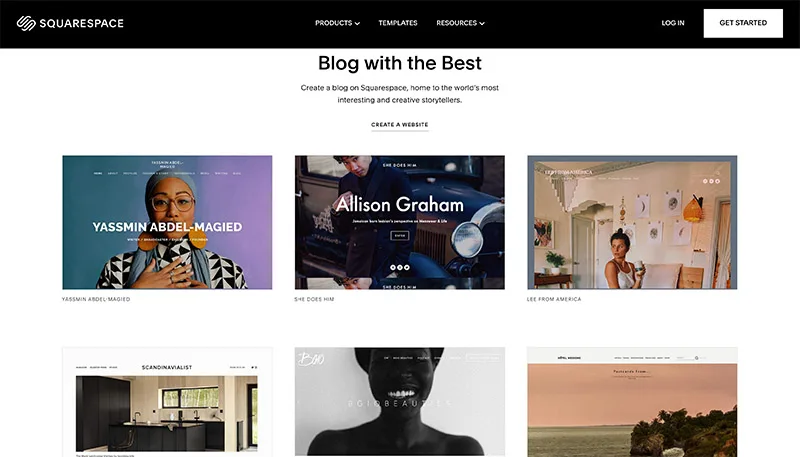
Ideal Use Cases
Squarespace shines in several key areas:
- Photographers and Creatives: If you’re a photographer, videographer, designer, or any other creative professional, Squarespace’s sleek templates and customization options are perfect for showcasing your work in a polished, elegant way.
- Small Businesses and Entrepreneurs: For small businesses or entrepreneurs who want to create a professional online presence without the hassle of custom development, Squarespace offers all the design tools you need, along with e-commerce solutions to get your store up and running quickly.
- Artists and Makers: With its clean, minimalist templates, Squarespace is ideal for artists, crafters, and makers who want to display and sell their work. The platform’s user-friendly e-commerce tools make it easy to create product pages, track inventory, and handle payments without a complicated setup.
- Hosting and Security Included
A great benefit of Squarespace is that it includes web hosting with every plan, so you won’t need to worry about finding a separate hosting provider. It also includes SSL certificates to keep your website and its visitors’ data safe. Squarespace’s hosting ensures fast loading speeds, which is crucial not only for keeping visitors happy but also for improving your search engine rankings. - Seamless E-Commerce Features
If you’re looking to sell products online, Squarespace makes it easy to set up and manage an online store. You can create beautiful product pages, manage inventory, process orders, and integrate payment systems like PayPal, Stripe, and Apple Pay. Plus, Squarespace supports the sale of digital products, so if you’re offering e-books, downloadable artwork, or photography, you can handle everything on one platform without needing additional tools. - Stunning Designs and Customizable Templates
One of the main reasons people love Squarespace is its collection of beautiful, professionally designed templates. These templates are fully customizable, meaning you can tweak everything—from colors to fonts and layout—to create a website that truly reflects your style or brand. Whether you’re a photographer wanting a simple, elegant portfolio or a small business in need of a functional but stylish website, Squarespace makes it easy to design a site that feels premium, with minimal effort.
Ghost: A Speedy and Feature-Packed Platform for Bloggers and Publishers
Ghost is a modern, open-source Content Management System (CMS) built specifically for bloggers, writers, and publishers. It’s designed with speed, simplicity, and powerful features in mind, making it an excellent choice for anyone looking to share their ideas or run a content-driven site. With a focus on delivering a fast, high-performance experience, Ghost allows for smooth user interaction and quick-loading pages, ensuring that your audience stays engaged.
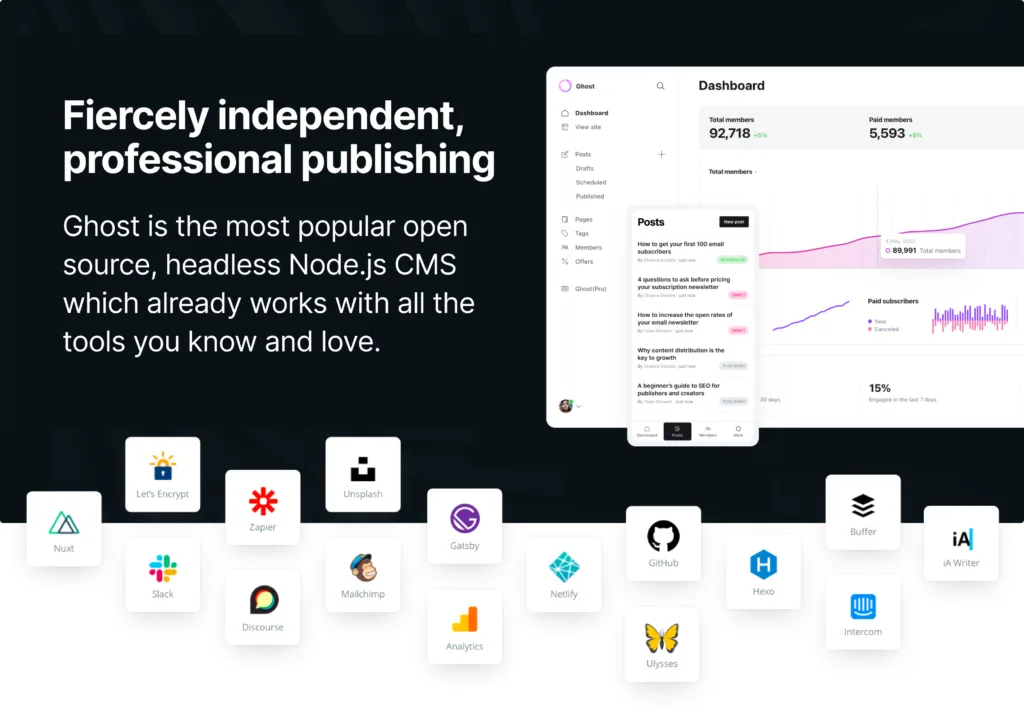
Ideal Use Cases
- Bloggers: Whether you’re an individual blogger or part of a content team, Ghost offers a streamlined interface that lets you focus on creating great content. With easy-to-use content management tools and flexible design options, it’s perfect for anyone looking to set up a personal or professional blog without unnecessary distractions.
- Publishers and Content Creators: Ghost is ideal for publishers who manage multiple contributors and large volumes of content. Its multi-user features, content scheduling, and collaborative tools make it easy to manage editorial workflows and streamline content production.
- Premium and Membership Sites: For those looking to monetize content, Ghost offers built-in membership and subscription tools. You can easily set up paid memberships or offer exclusive content to subscribers, making it an excellent option for running premium sites.
- Speed and Performance
Ghost stands out because of its focus on speed and performance. Unlike other CMS platforms that can become sluggish with added plugins and heavy themes, Ghost is built for efficiency. It’s optimized to load quickly, ensuring that your audience enjoys a seamless experience. With minimal bloat and a clean, fast architecture, Ghost keeps your site running smoothly, even as your content grows. - Customization and Flexibility
While Ghost is known for its simplicity, it doesn’t sacrifice flexibility. Users can choose from a variety of customizable themes or create their own unique design. For those who want more control, developers can build custom templates, integrate APIs, and add personalized functionality through JavaScript, HTML, and CSS, making it a versatile choice for advanced users. - Simple, User-Friendly Dashboard
Ghost’s dashboard is intuitive and user-friendly, providing an easy way to manage your site, track visitor traffic, and monitor engagement. Whether you’re an individual blogger or part of a larger editorial team, Ghost’s interface is designed to make managing your content as smooth and efficient as possible.
How to choose the right CMS ?
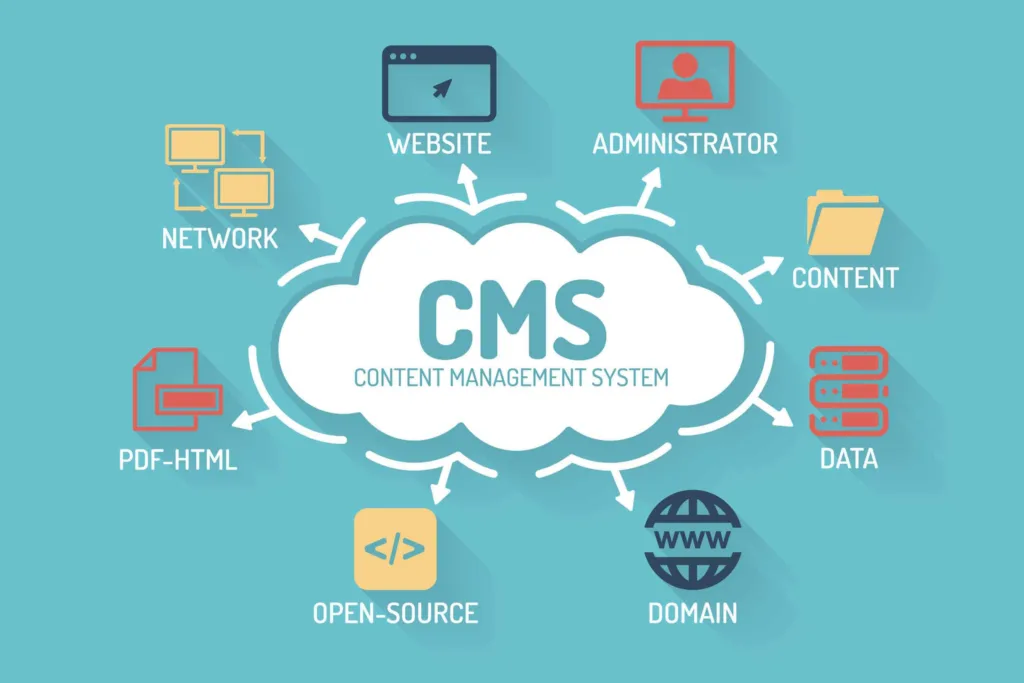
1. For Beginners: Wix or Squarespace.
- Wix: Perfect for those looking to create a website quickly and easily with its drag-and-drop builder, offering flexibility and customization.
- Squarespace: A great choice for those who want to build beautiful, visually appealing sites with ease, especially for creatives like photographers and artists.
2. For Bloggers: Ghost.
Ghost is designed for bloggers who want a fast, distraction-free environment to focus on content. It also includes built-in tools for monetization and a smooth, user-friendly experience.
3. For Complex Sites: Joomla or Drupal.
- Joomla: A strong option for building more advanced sites with a user-friendly interface and good customization options.
- Drupal: Best for large-scale, high-security websites that need scalability and deep customization, perfect for enterprises and government projects.
4. For Creative Projects: Squarespace.
Squarespace shines for creative projects, providing elegant templates and an intuitive platform to showcase portfolios, art, and design with minimal effort.
WordPress or Another CMS
WordPress remains the top choice as it is flexible, affordable and user-friendly. It has alternatives like Wix, Squarespace, Joomla, and Drupal each with their specific needs and unique features.
Choosing the right CMS totally depends on the user’s goals, technical skills and budget.
